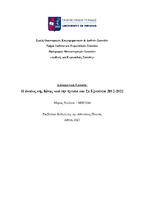Η άνοδος της Κίνας υπό την ηγεσία του Σι Τζινπίνγκ 2012-2022

View/
Keywords
Σι Τζινπίνγκ ; Κινεζική εξωτερική πολιτική ; Κινεζικό Όνειρο ; Belt and Road Initiative (BRI) ; Σινοαμερικανικές σχέσεις ; Στρατιωτικός εκσυγχρονισμός ; Διπλωματία Μείζονος Χώρας ; Σκέψη του Σι Τζινπίνγκ (Xi Jinping Thought) ; ΣτρατηγικήAbstract
This paper examines the transformation of China’s foreign policy under the leadership of Xi Jinping (2012–2022), examining how the country has pursued a more assertive and ideologically defined international strategy. It analyzes key dimensions such as Xi Jinping Thought, the Belt and Road Initiative (BRI), military modernization, territorial disputes in the South China Sea, the Taiwan issue, and China’s increasing use of soft power and UN peacekeeping missions. Drawing upon official Chinese discourse and secondary literature, the study investigates how Xi Jinping’s policies reflect a shift from Deng Xiaoping’s low-profile diplomacy toward a vision of “Major Country Diplomacy” and a “Community of Shared Future for Mankind.” The findings suggest that while China has strengthened its global position, its assertive behaviour has led to growing tensions with the West, reinforced geopolitical rivalries, and prompted new counterstrategies by regional and global actors. Ultimately, the study concludes that Xi’s China is more ambitious, more interventionist, and more ideologically driven in its external engagement.


